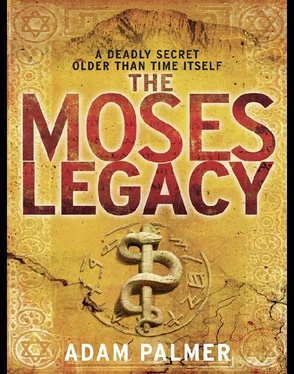Adam Palmer - The Moses Legacy
Здесь есть возможность читать онлайн «Adam Palmer - The Moses Legacy» — ознакомительный отрывок электронной книги совершенно бесплатно, а после прочтения отрывка купить полную версию. В некоторых случаях можно слушать аудио, скачать через торрент в формате fb2 и присутствует краткое содержание. Жанр: Триллер, на английском языке. Описание произведения, (предисловие) а так же отзывы посетителей доступны на портале библиотеки ЛибКат.
- Название:The Moses Legacy
- Автор:
- Жанр:
- Год:неизвестен
- ISBN:нет данных
- Рейтинг книги:4 / 5. Голосов: 1
-
Избранное:Добавить в избранное
- Отзывы:
-
Ваша оценка:
- 80
- 1
- 2
- 3
- 4
- 5
The Moses Legacy: краткое содержание, описание и аннотация
Предлагаем к чтению аннотацию, описание, краткое содержание или предисловие (зависит от того, что написал сам автор книги «The Moses Legacy»). Если вы не нашли необходимую информацию о книге — напишите в комментариях, мы постараемся отыскать её.
The Moses Legacy — читать онлайн ознакомительный отрывок
Ниже представлен текст книги, разбитый по страницам. Система сохранения места последней прочитанной страницы, позволяет с удобством читать онлайн бесплатно книгу «The Moses Legacy», без необходимости каждый раз заново искать на чём Вы остановились. Поставьте закладку, и сможете в любой момент перейти на страницу, на которой закончили чтение.
Интервал:
Закладка:
‘Exactly. They got some useful info from a paper that he had written and was trying to get published. But at any time he might have realized that he was being played for a sucker and start rocking the boat.’
‘And so they got Goliath to kill him.’
‘Yes.’
‘And they also tried to kill Gusack, Klein and Mansoor.’
‘And damn nearly succeeded. But I think we can rule out Mansoor as the main target. It was Klein and Gusack they wanted to silence.’
‘And now we’re giving them shelter.’
‘Well, there’s no reason not to.’
‘So we’re not worried about all that stuff about Joseph and Moses.’
‘Why should we be? There’s nothing new in it. The theories have been around for ages, and as you said, we can’t bump them off just for challenging the Bible.’
‘Okay, but what about the plague? Any danger that they brought it with them on their clothes?’
‘They arrived in swimsuits that they had just bought in Taba. And before we picked them up, they’d already taken a plunge in the Gulf of Eilat.’
‘So they were in water?’ she asked, nervously.
‘ Salt water. Trust me on this, Sarit: the worst they can manage is to ruffle the feathers of a few religious fundamentalists. They’re not going to bring the walls of Jericho tumbling down.’
Chapter 73
Participating in the open-air Samaritan Passover celebrations on Mount Gerizim was a rare privilege. Ordinary members of the public were not allowed into the fenced-off area – for logistical and security reasons – although several thousand came to witness the event from every vantage point they could find. Apart from the seven-hundred-strong Samaritan community and the police and soldiers on security duty, the only people who were allowed in were invited guests – the media, politicians from both Israel and the Palestinian Authority and people with the right connections.
So Daniel and Gabrielle could consider themselves highly honoured just to be there.
Unlike the Jewish seider in which any type of kosher meat or fish can be eaten, the Samaritan feast consisted of lamb, recalling the paschal lamb that the Israelites slaughtered and ate on the eve of the slaying of the firstborn son and the Exodus.
The celebration commenced in the afternoon, well before sunset, with the Samaritans clad in white robes and white-turbaned red fezzes making fires in eight-feet-deep concrete-lined pits. Each of the five extended families in the Samaritan community had a fire pit for itself, except the largest family, which had two. The fires were fuelled by branches from olive trees, with the foliage still attached.
Even the children were joining in the fun, with boys as young as five dragging olive branches from a huge pile and throwing them into the flaming pits. The boys were dressed in white trousers and shirts rather than traditional robes and their headgear consisted of baseball caps, some of which were reversed, American-style. Even amidst this ancient and most venerable celebration, there were occasional glimpses of modernity.
Off to one side, a trench was filled with a series of barrels lined with plastic bin liners, ready to catch the blood of the slaughtered lambs. When sunset came, the lambs were slaughtered with razor-sharp knives, the entrails removed, the blood washed away with hoses and the lambs skinned and impaled on huge wooden skewers. It was at this point, or shortly before, that some of the children cried, as the lambs had in many cases come to be thought of as ‘companion animals’, more like pets than livestock. But this was a rite of passage that prepared them for the concept of sacrifice to God.
After the slaughter, the skin, fat and entrails of the lambs were salted, placed on an altar of a heavy metal mesh over a fire at the end of the trench and offered up to God as a burnt offering, the Passover sacrifice.
Meanwhile, the lamb carcasses on the stakes were salted in preparation for cooking. But as the tradition was to eat the meat at midnight – when, according to biblical tradition, the Angel of Death appeared – the wooden stakes were not actually placed in the pits just yet.
As invited guests, Daniel and Gabrielle were able to wander freely amongst the crowds. Dov had not gone as far as to arrange an introduction for Daniel to the priests, much less the high priest, but Daniel and Gabrielle had been introduced to Aryeh Tsedaka, a Samaritan rabbi based in the Israeli town of Holon. So they took advantage of the quiet time after the stakes were prepared to sidle up to him. Daniel told Tsedaka about their adventures in Egypt, and his translation of Proto-Sinaitic script and the papyrus they had found in Mansoor’s office in which Ay had expressed his desire to be buried near Mount Gerizim.
‘And you think this man Ay could be the same as Ephraim the son of Joseph?’ asked Tsedaka.
‘Yes,’ Gabrielle cut in. ‘And his brother Anen could be Menasha.’
They were sitting a few yards from one of the fires, warming themselves against the slight chill in the evening air. Daniel looked tensely at Gabrielle. He wanted her to take a backseat role in this discussion, but hadn’t actually told her that in advance. They’d spent the last few days delicately stepping around the tension that hung between them and they had not talked about the events of the eve of Independence Day. It was as if they agreed, by their mutual silence, to treat it as a big mistake, to be filed away and forgotten.
Aryeh Tsedaka sat in silence for a few seconds, weighing up Gabrielle’s speculation. ‘And you bring this to me because the Samaritans are descended from the Joseph tribes of Israel?’
‘Tribe s?’ Gabrielle repeated, picking up on the plural.
Daniel stepped in. ‘My friend here is an Egyptologist. She is not so familiar with Jewish or Samaritan history.’
‘Ah, yes. Let me explain. You see, most Westerners think that there were twelve tribes of Israel – because Jacob had twelve sons. But actually there were thirteen. Joseph was the ancestor of two tribes: Ephraim and Menasha, and we are descended from both of those. Except for our priests who are descended from the tribe of Levi.’
‘Is that why you call yourselves Samaritans, rather than Josephites?’
‘We actually prefer to call ourselves Israelites. Samaritans is merely an Anglicization of the Hebrew name Shomronim, which simply means “those from Samaria”. In fact, a more correct version of our name would be Shomrim, which means “the Guardians”. Because we are the true guardians of the Torah that God gave to Moses.’
‘How do the Jews react to that?’ asked Gabrielle.
‘That is one of the more sad aspects of our history. The tribes of Ephraim and Menasha were part of the northern kingdom – that is, the Kingdom of Israel. This was distinct and separate from the southern kingdom of Judah except for a brief period of unity. We had land on both sides of the River Jordan. When the Assyrians invaded the northern kingdom 721 years before the birth of Jesus, the southern kingdom of Judah was spared because it was a vassal state at the time. But in the northern kingdom, they took 27,290 Israelites back to Assyria as captives.’
‘You know the number that precisely?’ asked Gabrielle.
‘History records it,’ said Tsedaka. ‘However, that was still a minority. Most of the Israelites remained in the land. Then, somewhat later, the southern kingdom of Judah was conquered, this time by the Babylonians, who carried off the Judeans into captivity. But then the Persians defeated the Babylonians and allowed the Judeans to return in the fifth century before Jesus. It was then that our problems began.’
‘Why?’
‘The Judeans returned in two batches. First a larger group of some 42,360 returned under Zerubbabel, with the intention of rebuilding the temple that the Babylonians had destroyed. But one wise and learned man refused to join them, because he considered the study of the scriptures to be more important than rebuilding the temple. His name was Ezra. Some say his knowledge of the scriptures equalled that of Moses himself. But he returned later, with a smaller group of followers – some 1,500 – all of them men.’
Читать дальшеИнтервал:
Закладка:
Похожие книги на «The Moses Legacy»
Представляем Вашему вниманию похожие книги на «The Moses Legacy» списком для выбора. Мы отобрали схожую по названию и смыслу литературу в надежде предоставить читателям больше вариантов отыскать новые, интересные, ещё непрочитанные произведения.
Обсуждение, отзывы о книге «The Moses Legacy» и просто собственные мнения читателей. Оставьте ваши комментарии, напишите, что Вы думаете о произведении, его смысле или главных героях. Укажите что конкретно понравилось, а что нет, и почему Вы так считаете.












